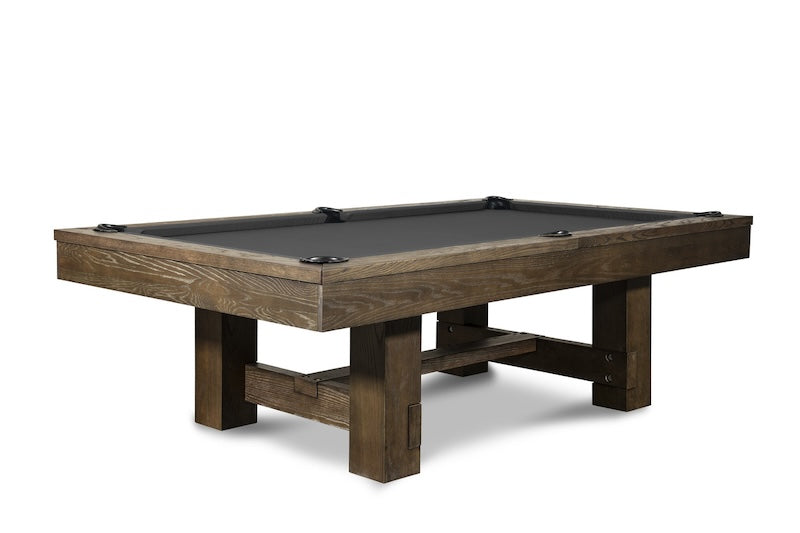
What Is A Slate Pool Table? Why Are Pool Tables Made Of Slate?
Billiards has long been a game of precision, strategy, and skill. Central to its appeal is the quality of the table it plays on. The slate pool table is a premium choice among the various types available. But what is a slate pool table? And why is this particular material so favored in the world of billiards? Read this article to find out the answer now.
What Is A Slate Pool Table?
A slate pool table is a billiard table with a Slate playing surface, a fine-grained metamorphic rock. This dense, smooth stone ensures a flat and consistent roll for the billiard balls. The best material for a slate pool table cover is usually a cloth, often felt, to create the playfield.

Slate pool table. Image source: Sawyer Twain
A quality slate table offers superior playability compared to non-slate alternatives. They are more durable and maintain their level surface longer. Yet, slate tables are more expensive due to their weight and quality. They are preferred in professional tournaments and by enthusiasts seeking a high-quality gaming experience.
See more: Pool cue
Why Are Pool Tables Made of Slate?
After knowing what is a slate pool table, let's explore why pool tables are made of slate. Slate has long been the gold standard for pool table surfaces. But what makes this natural stone the top choice for billiard aficionados worldwide?
- Flatness: Slate is a type of rock that can be polished to create a flat surface, making it the ideal material for pool tables because the balls will roll smoothly and predictably without any bumps or unevenness in the table
- Durability: Slate is highly durable and resistant to warping, humidity, and temperature changes. Proper care allows a slate pool table to last generations without losing shape or level.

The durability of a slate pool table. Image source: Pool tables For sale
- Consistency: Slate stays flat and even over time, while materials like wood can warp or change shape. This means slate tables offer a steady game experience for years.
- Weight: While the heaviness of slate can be a drawback for transportation, it's an advantage for stability. A heavy table is less prone to movement or vibrations during play, which could disrupt the game.
5 Key Features to Look For in A Slate Pool Table
When investing in a slate pool table, you seek more than just aesthetics. In fact, you want optimal performance and longevity. Here are 5 essential features that define a high-quality slate table for the best billiards experience:
- Slate thickness: The thicker the slate, the more stable the table will be and the less likely it is to warp or crack over time. The ideal thickness for pool table slate is ¾ of an inch.
- Slate bed construction: Pool tables are typically made with one or three-piece slate beds. One-piece slate beds are more expensive but durable and provide a more consistent playing surface. Three-piece slate beds are less expensive but more susceptible to warping and cracking over time.
- Cushions: The cushions are responsible for bouncing the balls back into play. Cushions come in a variety of different materials and densities. The best cushions for pool tables are made of high-quality rubber and provide a consistent bounce.
- Rails: The rails are on the wooden sides of the pool table. They are responsible for keeping the balls on the playing surface. Rails come in a variety of different materials and styles.
- Finish: A good finish will prevent the wood from scratches and stains and make the table easier to clean. The best finishes for pool tables are high-quality polyurethane or lacquer.

Slate thickness. Image source: Liberty Games
5 Benefits of Slate Pool Tables
Slate pool tables are the best choice for many enthusiasts and professionals alike. Here are five benefits of choosing a slate pool table:
- Precision Play: Slate provides an impeccably flat and smooth surface, ensuring the consistency of the ball. This level of precision is crucial for both casual play and professional tournaments.
- Durability: Slate is a sturdy and robust material that stands up well to wear and tear. Slate tables are less likely to get dents, scratches, or other surface imperfections than those made from different materials.
- Resistance to Environmental Factors: The dense nature of the slate means it's less susceptible to warping or distortion from humidity and temperature fluctuations, allowing a slate table to keep its shape and integrity in varied climates far better..
- Longevity: Slate pool tables are durable and can last many years, even with heavy use. This makes them a good investment for people who want a table that will only need to be replaced sometimes or repaired significantly.
- Stability: The weight of the slate ensures the table remains stable during play. Heavier tables are less likely to shift or vibrate when balls are struck with force, maintaining the integrity of the game.

A pool slate table with high resistance to environmental factors. Image source: Amazon
3 Disadvantages of Slate Pool Tables
While slate pool tables offer many benefits they might also limit your play, here are three disadvantages:
- Weight and Portability: One of the most significant challenges with slate pool tables is their weight. The heavy slate makes these tables difficult to move, transport, or reposition. Moving the table to another room or a new home can take time and effort.
- Cost: Due to the superior quality and longevity of slate pool tables, they tend to be more expensive than non-slate alternatives. The cost of pool tables can be considerable, potentially making them less accessible for casual players or those on a tight budget.
- Installation and Leveling: Setting up a slate pool table is complex. The table must be perfectly leveled to ensure optimal gameplay, which can be time-consuming. Furthermore, the seams between these pieces must be seamlessly joined and felted.

A big slate pool table. Image source: eFamily Fun
See more: pool table size
Compare One-Piece vs. Three-Piece Slate Table
|
Feature |
One-Piece Slate |
Three-Piece Slate |
|
Construction |
Single large piece of slate |
Three separate slate pieces |
|
Weight |
Heavier |
Lighter (when disassembled) |
|
Installation |
More challenging, and requires more manpower |
Easier to maneuver and install |
|
Leveling |
Easier to level initially |
May require more precise leveling at the seams |
|
Stability |
Extremely stable, no seams |
Potential for slight unevenness at seams |
|
Transportation |
Difficult to move, may not fit through doorways |
Easier to transport, can fit through standard doors |
|
Cost |
Generally less expensive |
Usually more expensive |
|
Maintenance |
Lower long-term maintenance |
May require occasional releveling of seams |
|
Playability |
Perfectly flat playing surface |
Excellent play, but may have slight imperfections at seams |
|
Durability |
Very durable, with no seams to separate |
Durable, but seams may separate over time |
|
Ideal for |
Commercial settings, permanent installations |
Home use, rooms with limited access |
-
One-piece slates offer superior stability and require less maintenance but are harder to install and move.
-
Three-piece slates are more versatile for transportation and installation but may require more precise leveling and occasional maintenance.
Frequently Asked Question
What Is The Difference Between A Slate Pool Table And A Regular Pool Table?
-
Weight: A slate pool table is heavy, around 600 - 1000 lbs or more, while a regular pool table weighs around 200 - 500 lbs.
-
Playing Surface Material: A slate pool table uses natural slate rock, while a regular pool table uses MDF, plywood, or other engineered wood.
-
Surface: A slate pool table is extremely flat and level, while regular pool tables may warp or become uneven over time.
-
Durability: A slate pool table is highly durable and can last generations, while a regular pool table lasts around 5 - 15 years.
-
Cost: A slate pool table is more expensive, ranging from $2,000 to $5,000+, while a regular pool table is less expensive, typically $500 to $2,000.
-
Installation: Slate pool table requires professional installation, while regular pool tables can often be self-installed.
Are Slate Pool Tables Better?
Slate pool tables are generally superior due to their precision, durability, and stability. They offer a consistent playing surface and resist warping over time. While they're often pricier, slate tables are preferred over non-slate alternatives for severe players.
What makes a pool table slate?
People call the pool table "slate" when its playing surface is made from dense, fine-grained metamorphic rock. This natural stone provides
- A flat, consistent surface.
- Ensuring precise ball movement.
- Durability.
- Resistance to warping.
Hopefully, Big Cat have provided a clear answer to the question of what is a slate pool table. In billiards, the quality of the table affects the game and experience. While they might be pricier upfront, their outstanding performance justifies the cost. Recognizing the slate's excellence is essential for enthusiasts seeking the best playing experience.
See more related articles


